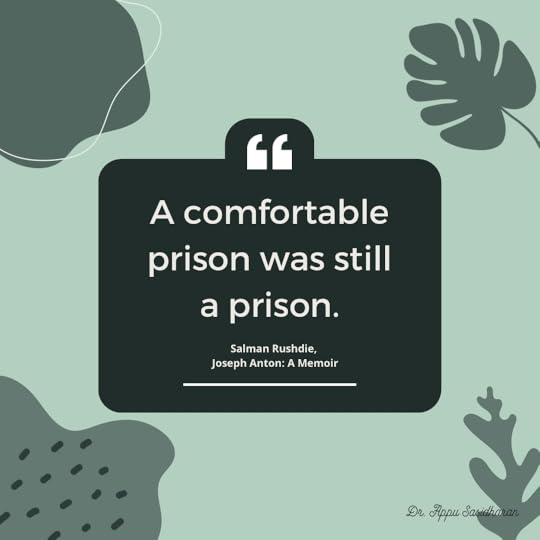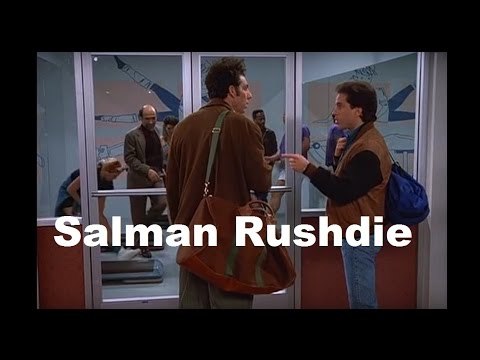What do you think?
Rate this book


636 pages, Hardcover
First published January 1, 2012

“ When a book leaves its author's desk it changes. Even before anyone has read it, before eyes other than its creator's have looked upon a single phrase, it is irretrievably altered. It has become a book that can be read, that no longer belongs to its maker. It has acquired, in a sense, free will. It will make its journey through the world and there is no longer anything the author can do about it. Even he, as he looks at its sentences, reads them differently now that they can be read by others. They look like different sentences. The book has gone out into the world and the world has remade it"
"He was learning that to win a fight like this, it was not enough to know what one was fighting against. That was easy. He was fighting against the view that people could be killed for their ideas, and against the ability of any religion to place a limiting point on thought. But he needed, now, to be clear of what he was fighting for. Freedom of speech, freedom of the imagination, freedom from fear, and the beautiful, ancient art of which he was privileged to be a practitioner. Also skepticism, irreverence, doubt, satire, comedy, and unholy glee. He would never again flinch from the defense of these things."
"Free speech isn't absolute. We have the freedoms we fight for and we lose those we don't defend."
"There was another new word he had to learn. Here it was on the radio: extraterritoriality. Also known as state-sponsored terrorism. Voltaire had once said that it was a good idea for a writer to live near an international frontier so that, if he angered powerful men, he could skip across the border and be safe. Voltaire himself left France for England after he gave offense to an aristocrat, the Chevalier de Rohan, and remained in exile for seven years. But to live in a different country from one's persecutors was no longer to be safe. Now there was extraterritorial action. In other words, they came after you."
"The first gift he received from his father, a gift like a message in a time capsule, which he didn't understand until he was an adult, was the family name. "Rushdie" was Anis's invention; his father's name had been quite a mouthful, Khwaja Muhammad Din Khaliqi Dehlavi, a fine Old Delhi name. Anis renamed himself "Rushdie" because of his admiration for Ibn Rushd, "Averroës" to the West, the twelfth-century Spanish-Arab philosopher of Córdoba who rose to become the qadi or judge of Seville, the translator of and acclaimed commentator upon the works of Aristotle. His son bore the name for two decades before he understood that his father, a true scholar of Islam who was also entirely lacking in religious belief, had chosen it because he respected Ibn Rushd for being at the forefront of the rationalist argument against Islamic literalism in his time.
"At least," he told himself when the storm broke over his head, "I'm going into this battle bearing the right name." "From beyond the grave his father had given him the flag under which he was ready to fight, the flag of Ibn Rushd, which stood for intellect, argument, analysis and progress, for the freedom of philosophy and learning from the shackles of theology, for human reason and against blind faith, submission, acceptance and stagnation. Nobody ever wanted to go to war, but if a war came your way, it might as well be the right war, about the most important things in the world, and you might as well, if you were going to fight it, be called "Rushdie," and stand where your father had placed you, in the tradition of the grand Aristotelian, Averroës, Abul Walid Muhammad ibn Ahmad ibn Rushd."
“There was no such thing as absolute security. There were only varying degrees of insecurity. He would have to learn to live with that.
He was offered Kevlar bulletproof vests to wear. He refused them. And when he walked from the door of a car to the door of a building or back again, he consciously slowed down. He would not scuttle. He would try to walk with his head held high.
"If you succumb to the security description of the world," he told himself, "then you will be its creature forever, its prisoner." The security worldview was based on the so-called worst-case analysis. But the worst-case analysis of crossing a road is that there was a chance you would be hit by a truck, and therefore you should not cross the road. But people crossed roads every day and were not hit by trucks. This was a thing he would have to remember. There were only varying degrees of insecurity. He had to go on crossing roads."
“The lessons one learns at school are not always the ones the school thinks it's teaching.”
"Rage made you the creature of those who enraged you, it gave them too much power. Rage killed the mind, and now more than ever the mind needed to live, to find a way of rising above the mindlessness."
"Man was the storytelling animal, the only creature on earth that told itself stories to understand what kind of creature it was. The story was his birthright, and nobody could take it away."


… a reception at Tina Brown’s house, where he found himself standing in a small circle of guests whose other members were Martin Amis, Martin Scorsese, David Bowie, Iman, Harrison Ford, Calista Flockhart and Jerry Seinfeld…For some reason this seemed like it would be an unnerving and paranoiac modernist turn on memoir-writing, with some swashbuckling-special-branch derring-do on the side. In the end you know a lot more about a typically fretful middle-aged writer and not so much about the extraordinary circumstances he lived; funny how that could be, but I think that possibly the truly exotic parts couldn't yet be printed.
One other thing happened in Paris. Caroline Lang, Jack Lang's brilliant and beautiful daughter, [me: needless name-dropping] came to keep him company at the Hotel de 'Abbaye one afternoon, and because of her beauty, and the wine, and the difficulties with Elizabeth, they became lovers; and immediately afterward decided not to do that again, but to remain friends.Elizabeth finds out: at some point she "did what people always did and read his journal when he wasn't there and found out about his day in Paris with Caroline Lang and then they had the painful conversation people always had ..." Did what people always did? What a pompous jerk.
"he looked at the expression on her face and suddenly thought, She's having sex, sex with hundreds of men at the same time, and they don't even get to touch her, there's no way any actual man can compete with that." [italics in the original].There is this bizarrely bile-filled and nonsensical passage recounting when Padma/Illusion "stabbed him in the heart" nd something I couldn't follow about ancient Scrooge McDuck and his pleasure dome in Duckburg, USA with a tame tyrannosaurus flanked by his loyal velociraptors and ... - I have no idea but it was just ugly to read. Amazing.